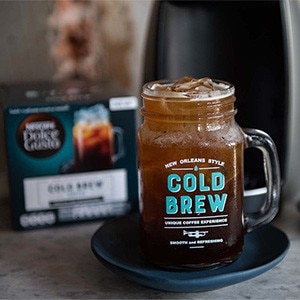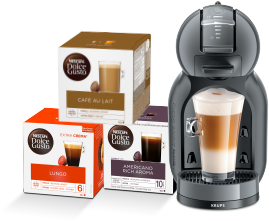Decaf Coffee, a New Choice for Coffee Lovers

In today’s world, coffee is considered essential to our daily routine. This refreshing drink kickstarts our day, something many of us cannot live without. On average, it’s recommended to consume no more than 300 milligrams of caffeine per day. A single cup of coffee contains 150 milligrams, (depending on the style of coffee). So, for keen coffee drinkers wanting to manage their caffeine intake, this limits us to 1-2 cups per day. With this in mind, decaf coffee is a great alternative.
What is Decaf Coffee?
‘Decaf’ as it’s known, is a decaffeinated coffee with a caffeine content of only 0-3 % per cup. In decaf coffee, up to 97% or more of the caffeine is removed or leached, leaving a taste similar to regular coffee. Decaf could be compared to alcohol-free drinks which retain a similar flavor to their full strength counterparts, but perhaps less enjoyable for the sake of a healthier body.
Surprisingly, decaf coffee has been around for over 200 years but has only recently grown in popularity. In 1906, it was first produced by Kaffé Hag, becoming very popular in Germany and other western countries. At that time, the image of decaf coffee was that of a premium product, luxuriously packaged.
Difference Between Caffeinated and Decaffeinated Coffee
In addition to being 97% lower in caffeine, the characteristics may differ only slightly from that of regular coffee. The experience of drinking it is still enjoyable, but decaf offers a lighter taste, color, flavor and aroma. For those not so keen on dark coffee, decaf is a great alternative, and more importantly, much healthier than consuming excessive amounts of caffeine, likely to be more than the body needs.
The Advantages of Caffeinated Coffee
- Keeps the body feeling fresh and energetic, keeps the mind alert and ready to start the day.
- Reduces drowsiness and also helps the body relieve fatigue from sleep deprivation.
- Helps concentration throughout the working day.
- Helps balance moods and reduce depression.
- Boosts the metabolism.
- Research has confirmed that consuming no more than 3 cups of coffee per day helps reduce the risk of certain diseases, resulting in a lower mortality rate.
- Antioxidants are present in caffeine, so drinking in moderation can help slow the symptoms of Parkinson's disease, gallstones, colon and rectal cancer, and diabetes.
The Advantages of Decaffeinated Coffee
- Contains the same amount of antioxidants as caffeinated coffee, therefore, it also helps to reduce the risk of developing diseases such as Parkinson's disease, gallstones, cancer and diabetes.
- Contain nutrients that help keep the skin healthy with a beautiful complexion.
- The body receives more nutrients including magnesium, potassium, niacin and vitamin B3.
- Reduces the risk of developing liver disease and that can occur with excessive consumption of caffeinated coffee.
- Good for those whose are sensitive to the effects of caffeine. Helps to reduce palpitations, headaches and insomnia and allows higher consumption and less concern about these symptoms.
Who Should Drink Both Types of Coffee?
Caffeinated coffee is suitable for:
Working people who want to start their day refreshed and maintain a clear head. Caffeinated coffee is not recommended for:
Children or the elderly. They are advised to avoid this type of coffee because of the negative effects on the body that include insomnia, palpitations, increased blood pressure, a lack of concentration and a stimulant to faster speech, as the body is constantly awake.
Decaffeinated coffee is suitable for:
Those with an underlying medical condition
Caffeine may aggravate the symptoms of some conditions such as insomnia, chronic headache, migraine, Gastroesophageal reflux disease (GERD), heart arrhythmia, high blood pressure and stomach ulcers.
Those on medication
Caffeine interacts with certain drugs, therefore, it may cause unwanted side effects or the drugs may lose effectiveness. Especially at risk is medication related to the treatment of neurological diseases as well as antibiotics and anticoagulants.
Children and pregnant women
If it is essential for you to drink coffee, a decaf coffee is a good alternative, helping limit the amount of caffeine that may negatively affect the body.
NESCAFÉ® Dolce Gusto® Cold Brew, Limited Caffeine Coffee for a Healthier Body
In addition to decaf there is chicory coffee, a New Orleans-style. The taste and aroma are similar to decaf but healthier to the body, containing no caffeine. If you want to enjoy coffee with less caffeine while still enjoying the taste of coffee in your own home, we recommend NESCAFÉ® Dolce Gusto® Cold Brew containing 21% chicory essence and 79% coffee beans. This helps to reduce the intensity of the coffee. In addition, the cold brew method produces less caffeine and acidity than conventional hot coffee meaning it is better for the stomach.
This is yet another innovative product from Nescafe Dolce Gusto® who remain proud to continually develop quality coffee to be enjoyed by all. Although Nescafé Dolce Gusto® Cold Brew is not a decaffeinated coffee it is still a healthy choice, containing only a limited amount of caffeine allowing you freedom to enjoy coffee all day long.











